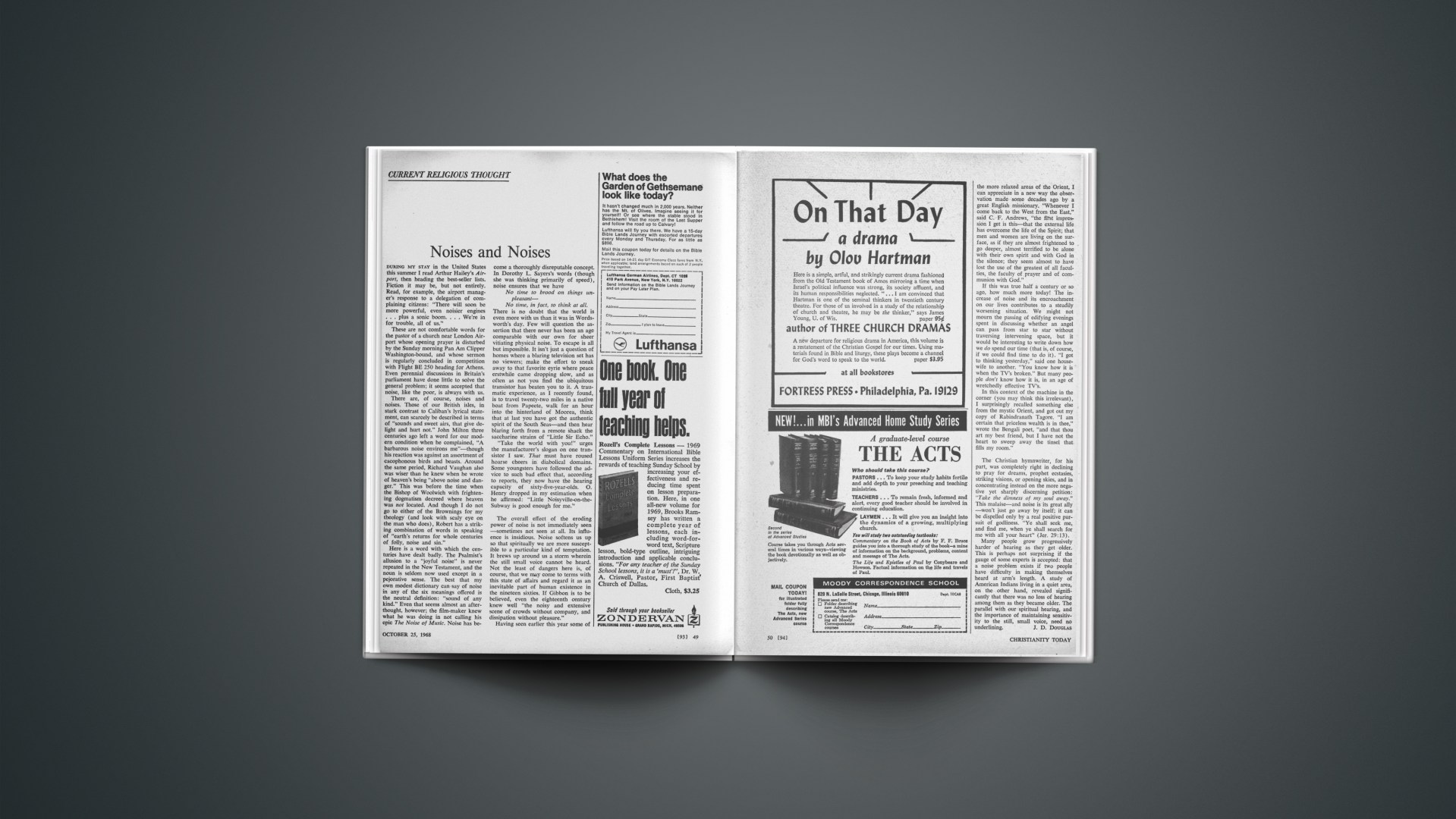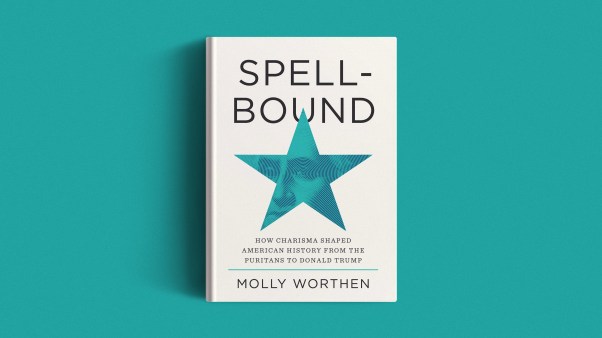During my stay in the United States this summer I read Arthur Hailey’s Airport, then heading the best-seller lists. Fiction it may be, but not entirely. Read, for example, the airport manager’s response to a delegation of complaining citizens: “There will soon be more powerful, even noisier engines … plus a sonic boom.… We’re in for trouble, all of us.”
These are not comfortable words for the pastor of a church near London Airport whose opening prayer is disturbed by the Sunday morning Pan Am Clipper Washington-bound, and whose sermon is regularly concluded in competition with Flight BE 250 heading for Athens. Even perennial discussions in Britain’s parliament have done little to solve the general problem; it seems accepted that noise, like the poor, is always with us.
There are, of course, noises and noises. Those of our British isles, in stark contrast to Caliban’s lyrical statement, can scarcely be described in terms of “sounds and sweet airs, that give delight and hurt not.” John Milton three centuries ago left a word for our modern condition when he complained, “A barbarous noise environs me”—though his reaction was against an assortment of cacophonous birds and beasts. Around the same period, Richard Vaughan also was wiser than he knew when he wrote of heaven’s being “above noise and danger.” This was before the time when the Bishop of Woolwich with frightening dogmatism decreed where heaven was not located. And though I do not go to either of the Brownings for my theology (and look with scaly eye on the man who does), Robert has a striking combination of words in speaking of “earth’s returns for whole centuries of folly, noise and sin.”
Here is a word with which the centuries have dealt badly. The Psalmist’s allusion to a “joyful noise” is never repeated in the New Testament, and the noun is seldom now used except in a pejorative sense. The best that my own modest dictionary can say of noise in any of the six meanings offered is the neutral definition: “sound of any kind.” Even that seems almost an afterthought, however; the film-maker knew what he was doing in not calling his epic The Noise of Music. Noise has become a thoroughly disreputable concept. In Dorothy L. Sayers’s words (though she was thinking primarily of speed), noise ensures that we have
No time to brood on things unpleasant—
No time, in fact, to think at all.
There is no doubt that the world is even more with us than it was in Wordsworth’s day. Few will question the assertion that there never has been an age comparable with our own for sheer vitiating physical noise. To escape is all but impossible. It isn’t just a question of homes where a blaring television set has no viewers; make the effort to sneak away to that favorite eyrie where peace erstwhile came dropping slow, and as often as not you find the ubiquitous transistor has beaten you to it. A traumatic experience, as I recently found, is to travel twenty-two miles in a native boat from Papeete, walk for an hour into the hinterland of Moorea, think that at last you have got the authentic spirit of the South Seas—and then hear blaring forth from a remote shack the saccharine strains of “Little Sir Echo.”
“Take the world with you!” urges the manufacturer’s slogan on one transistor I saw. That must have roused hoarse cheers in diabolical domains. Some youngsters have followed the advice to such bad effect that, according to reports, they now have the hearing capacity of sixty-five-year-olds. O. Henry dropped in my estimation when he affirmed: “Little Noisyville-on-the-Subway is good enough for me.”
The overall effect of the eroding power of noise is not immediately seen—sometimes not seen at all. Its influence is insidious. Noise softens us up so that spiritually we are more susceptible to a particular kind of temptation. It brews up around us a storm wherein the still small voice cannot be heard. Not the least of dangers here is, of course, that we may come to terms with this state of affairs and regard it as an inevitable part of human existence in the nineteen sixties. If Gibbon is to be believed, even the eighteenth century knew well “the noisy and extensive scene of crowds without company, and dissipation without pleasure.”
Having seen earlier this year some of the more relaxed areas of the Orient, I can appreciate in a new way the observation made some decades ago by a great English missionary. “Whenever I come back to the West from the East,” said C. F. Andrews, “the first impression I get is this—that the external life has overcome the life of the Spirit; that men and women are living on the surface, as if they are almost frightened to go deeper, almost terrified to be alone with their own spirit and with God in the silence; they seem almost to have lost the use of the greatest of all faculties, the faculty of prayer and of communion with God.”
If this was true half a century or so ago, how much more today! The increase of noise and its encroachment on our lives contributes to a steadily worsening situation. We might not mourn the passing of edifying evenings spent in discussing whether an angel can pass from star to star without traversing intervening space, but it would be interesting to write down how we do spend our time (that is, of course, if we could find time to do it). “I got to thinking yesterday,” said one housewife to another. “You know how it is when the TV’s broken.” But many people don’t know how it is, in an age of wretchedly effective TV’s.
In this context of the machine in the corner (you may think this irrelevant), I surprisingly recalled something else from the mystic Orient, and got out my copy of Rabindranath Tagore. “I am certain that priceless wealth is in thee,” wrote the Bengali poet, “and that thou art my best friend, but I have not the heart to sweep away the tinsel that fills my room.”
The Christian hymnwriter, for his part, was completely right in declining to pray for dreams, prophet ecstasies, striking visions, or opening skies, and in concentrating instead on the more negative yet sharply discerning petition: “Take the dimness of my soul away.” This malaise—and noise is its great ally—won’t just go away by itself; it can be dispelled only by a real positive pursuit of godliness. “Ye shall seek me, and find me, when ye shall search for me with all your heart” (Jer. 29:13).
Many people grow progressively harder of hearing as they get older. This is perhaps not surprising if the gauge of some experts is accepted: that a noise problem exists if two people have difficulty in making themselves heard at arm’s length. A study of American Indians living in a quiet area, on the other hand, revealed significantly that there was no loss of hearing among them as they became older. The parallel with our spiritual hearing, and the importance of maintaining sensitivity to the still, small voice, need no underlining.
J. D. DOUGLAS










